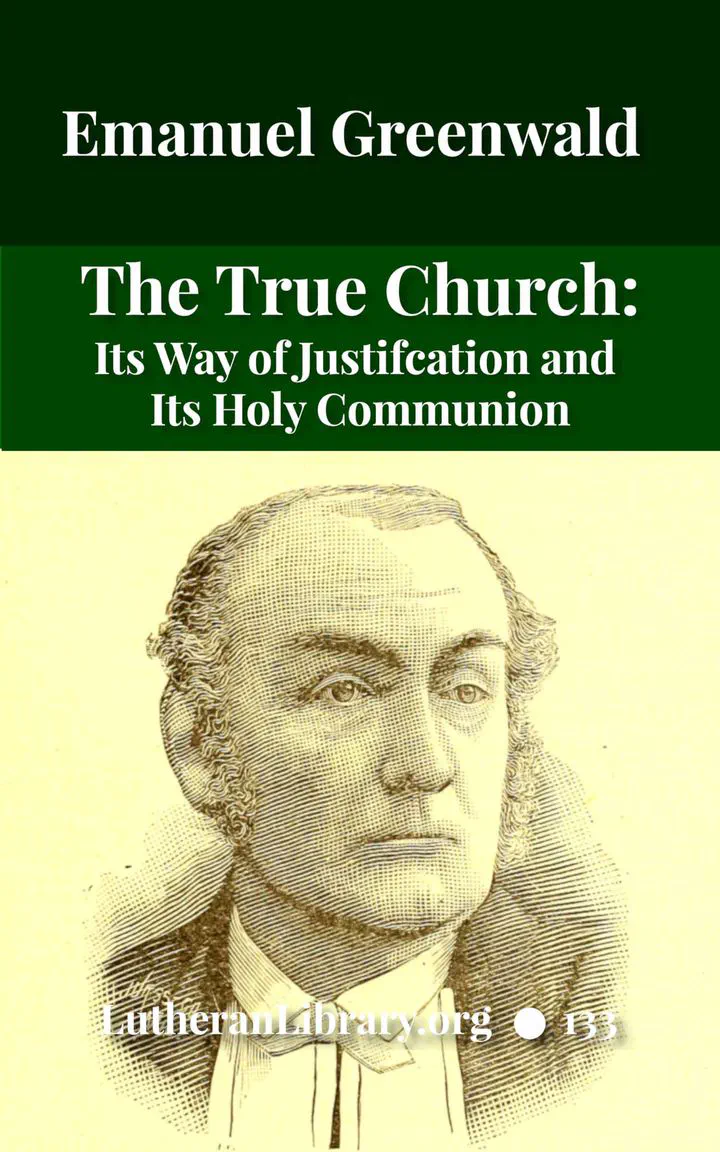The True Church: Its Way of Justification and Its Holy Communion by Emanuel Greenwald

“The doctrine of Justification by Faith alone, was the turning point of the Reformation; it was the experience of its necessity and efficacy in the heart of Martin Luther that constituted his best qualification for the work of the Reformation; and as it distinguished the Lutheran Church from the Church of Rome, so it has come to be regarded as the distinguishing mark of separation between Protestantism and Romanism.” — Emanuel Greenwald
Level of Difficulty: Primer: No subject matter knowledge needed.
Book Contents
Preface
Justification by Faith.
- The Nature of Justification
- The Ground Of Justification
- Justification, or, a judicial acquittal, demands a perfect righteousness as the ground of it.
- We have not in our hearts and lives a personal righteousness that can constitute the ground of our justification.
- Christ’s righteousness is the only ground of our justification.
- Means Of Justification
- We have in this, subject the great line of distinction between truth and error.
- We have in this subject the source of greatest consolation to Christian minds.
- We have in this subject the answer to be given to anxious souls who inquire the way of salvation.
The Holy Communion.
- A. The True Doctrine
- It has been charged that the doctrine of Luther, and of the Lutheran Church, differs little if in anything, from Transubstantiation.
- Another common objection to the doctrine of Luther, and a favorite mode of rendering it absurd to the minds of unthinking persons, is to ask:
- It is further alleged as an objection to this doctrine, that it is incomprehensible.
- One of the commonest and most flippant objections we hear, is the assertion that this doctrine is Romanism.
- It is objected that the Lutheran Church teaches the doctrine of Consubstantiation.
- B. Practical Conclusions
- I will not doubt nor wrangle, but simply believe the Word of my Lord, and yield my reason to the Supreme Reason, in this, and all other doctrines, and ordinances, and institutions of the Gospel.
- I will endeavor always to commune with the solemn awe which the nature of the Holy Communion inspires.
- I will sanctify my heart, and commune at the Lord’s Table, with clean hands and pure lips, because the holy presence of the Lord demands it.
- A. The True Doctrine
The True Church.
- What is the Church?
- The Essential Characteristics
- There must be the true doctrine.
- This definition of the True Church requires the Sacraments to be rightly administered.
- Why The Lutheran Church Claims To Be The True Church
- We are the True Church, because we have the True Head of the Church.
- We are the True Old Church, because we have the True Church succession.
- We are the True Church because we have the true faith.
- We are the True Church, because we have the True, Old, Apostolic, Christian Baptism.
- We are the True Church because we have the true Lord’s Supper.
- We are the True Church because we have the true ministry.
- We are the True Church because we have the real old keys.
- We are the True Church because we have, and hold, the true Word of God.
- We are the True Church, because we have the true cross, and the way of salvation by it.
- We are the True Church, because in it we have the true happy deathbeds of the saints.
Publication Information
- Lutheran Library edition first published: 2017-10-19
- Copyright: CC BY 4.0
Authors
(1811-1885)
“A good man and full of the Holy Ghost and of faith.” He trained under the renowned Dr. David F. Schaeffer, “walking 14,000 miles in getting his education”, and was licensed by the Maryland Synod and then the Joint Synod of Ohio. Rev. Greenwald was the first president of the Board of Trustees of Capitol University, Columbus and established the first English Lutheran church of Columbus. As first editor of the Lutheran Standard he fought the “New Measures”.